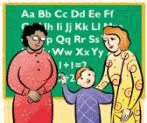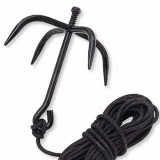
Parent Teacher Conferences are a terrific opportunity for communication between educators and the families of their students, but remember, they aren’t the only one! Preparation for conferences, and frankly, any and all communication that will occur during kindergarten, has to take place at the beginning of the school year (*great* Michaele, thanks for telling me in October!). What opportunities for communication might you have?
~Many districts have “Back to School” picnics or an Open House Night where families and their children visit the school, meet their teachers, and perhaps even see the classroom for the first time. This first impression sets the tone, so sincerity, respect, and a cheerful greeting go a long way in making children and their families feel welcome.
~E-mail communication has steadily been replacing the traditional “teacher notes” that used to be sent home.
~Many teachers call parents, making sure that each family hears from the teacher weekly for updates, humorous anecdotes, or suggested activities that families can help their child with at home.
~Monthly class newsletters are another way for teachers to communicate with parents throughout the year, touching on concepts covered, noting special projects and events, etc.
~Classroom blogs or web sites are accessible by families with computer access at home.
Whatever form(s) of communication a teacher chooses to utilize with parents and families, it/they must be used consistently. Sporadic newsletters or notes, only calling home if there’s a problem, or taking too long to reply to a note/e-mail or return a phone call from a parent may be interpreted by parents as disorganization or a lack of caring on the teacher’s part.
*****
The ways I communicate with parents include:
* Asking parents if they’d like to receive weekly classroom notes via e-mail, and obtaining e-mail address from those who do.
* Sending out paper copies of the class note each Friday to families who don’t have computer access.
* Sending home a monthly calendar in advance so parents can plan to volunteer in the classroom, act as chaperones for us on a field trip, donate needed materials, or send in a special snack.
* Utilizing one prep time as my designated “return calls” time (that parents are told of in advance) so parents know when to expect a call from me. Uninterrupted work time with my students and their parents’ uninterrupted activities in their own workplaces are equally important to me.
* Parent Teacher Conferences, formally scheduled twice a year, though I let parents know they can schedule a conference any time with me if they’d like to touch base about their child.
I’ve found that providing multiple ways to communicate with parents tends to take most of the pressure off of the time we spend together “formally” at Parent Teacher Conferences. Regular communication from the start of school means that there are usually no surprises and no time lost to questions like “Well, what does my kid do in here each day?” The rapport created between parents and teachers early on makes it likely that parents will attend the conferences and communicate more with teachers... two very good things!

******************************************************************************
Conference Tips:
* Post your conference schedule outside of your classroom door so parents can check it instead of interrupting your conference with another family.
* Make sure your report cards, assessments, classwork, etc. are in order and accessible to you on your desk so you can move through each conference smoothly, even if they are scheduled back to back.
* Create a sign in sheet so you have a record of who attended.
* Set up a small table and chairs in the hallway so parents who arrive early can wait comfortably. Leave books, education articles, a copy of the state standards, fliers from the P.T.A. etc. that they might find interesting.
* Make sure every student has at least one terrific project or artwork sample on display in the hallway AND in the classroom.
* Speaking with several (or many!) families during conferences can take its toll on your voice. Keep hydrated with water, but don’t be rude- I buy a case of bottled water so that I can offer each parent some as well.
* I like to present parents with a portfolio/folder of their child’s work that we can go over in addition to the report card. I keep enough samples and assessments in my own folders for documentation, and have student work displayed in the classroom and hallway, but parents do enjoy taking some of their child’s special work home with them after meeting with the teacher.
* It’s important to stay on schedule. Parents often use their lunch break or get special permission to leave work in order to meet with you, so setting a time limit, and politely offering to schedule additional time at some later date if necessary is essential so the parents who are waiting for their turn are seen on time. If you know in advance a particular conference is going to “run long,” block out two time slots for that family.
* Remember, even “difficult” conferences can be very helpful and provide you and your students’ parents with essential information. I have always thanked parents for attending their child’s conference, even when things haven’t run as smoothly as we might have liked. We all have “off days,” but that doesn’t have to ruin communication for the entire year.
* Schedule a fifteen minute break so that you can eat a quick snack (keep a toothbrush handy since you don’t want to be “that teacher with lettuce stuck in his/her teeth”), visit the bathroom or get a breath of fresh air to recharge your batteries.
* When you next have all of your students with you in class, make sure you let them know how nice it was to have spent time with their families!


